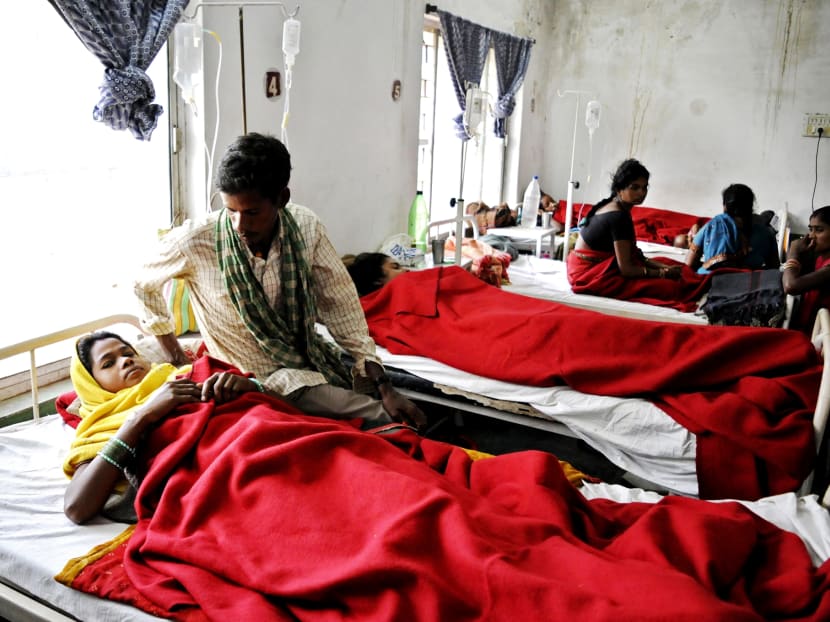13 dead, dozens hospitalised after botched sterilisation in India
BHUBANESWAR (India) — Ms Nem Bai was told that getting a tubectomy would be an easy process, that she would be home by sunset a few hundred rupees richer and back to work in the fields within two days.

Women who had undergone sterilisation surgeries receiving treatment at the District Hospital in Bilaspur in the Indian state of Chhattisgarh on Nov 12. At least a dozen have died and many others fallen ill following similar surgeries. Photo: AP
BHUBANESWAR (India) — Ms Nem Bai was told that getting a tubectomy would be an easy process, that she would be home by sunset a few hundred rupees richer and back to work in the fields within two days.
Instead, the 35-year-old mother of five was incapacitated within hours of having the surgery at a mass sterilisation camp in the Indian state of Chhattisgarh on Saturday, her widower told Reuters. She was one of 13 women who have died since.
“The entire night, she was in tremendous pain,” said Mr Ramavtar Suryavanshi while waiting in his village for his wife’s body to be delivered from the hospital.
By early morning when Mr Suryavanshi rushed Ms Bai to a private hospital nearby, his wife was unable to speak. Within 20 minutes of being admitted to intensive care, she was dead.
Dozens more women remain in hospital and 20 are critically ill after operations performed by a doctor accused of using rusty equipment in a dirty operating room, highlighting the dangers of the world’s largest surgical contraception programme.
“They are in a state of shock,” said Dr K N Choudhary, a doctor at Chhattisgarh Institute of Medical Sciences, where several women were being treated.
Dr R K Gupta, an experienced doctor, carried out more than 80 surgeries that day at a village family planning camp in Bilaspur district, the police said.
Such camps are held regularly as part of a long-running effort to control India’s booming population, and operations at the camps are often conducted within minutes, with little time to maintain hygiene.
Nearly 600 deaths were reported between 2009 and 2012, the government said.
The cause of the latest deaths was not immediately clear, but officials said the victims had shown signs of toxic shock, possibly because of dirty surgical equipment or contaminated medicine.
“Preliminary reports showed that the medicines administered were spurious and also that the equipment used was rusted,” senior local government official Siddharth Komal Singh Pardeshi told Reuters.
Dr Gupta’s mass sterilisation took less than three hours with the help of two assistants working in a dirty, abandoned private hospital, officials said, and contravened government guidelines to limit such operations to 30 a day.
A seven-member team of doctors from New Delhi arrived in Bilaspur yesterday to investigate what went wrong, and the local government has registered with the police a case of causing death by negligence against Dr Gupta.
The local media said the doctor had blamed medicine that the women had been later given and denied making any mistakes. He could not be reached by Reuters for comment.
Many of the women had received payments of 1,400 rupees (S$29) for having the surgery, officials said. Health workers also received smaller payments for bringing women to the camp.
“I would have been happier if they gave her the right treatment instead of giving her the money,” said Mr Suryavansh. His youngest child is three months old and was breastfed by Ms Bai.
Tubectomies are considered major surgeries but Indian doctors often exceed daily limits. Before guidelines were set, there were reports of doctors carrying out as many as 200 surgeries a day, said Dr Suneeta Mittal, head of gynaecology at Fortis Memorial Research Institute near New Delhi.
REUTERS





